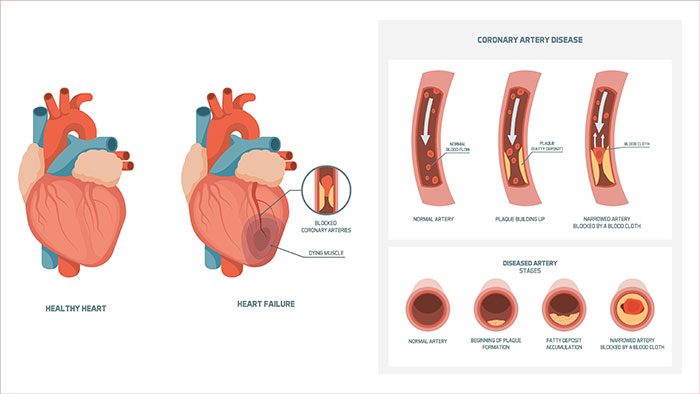
Coronary Heart Disease (CHD), or coronary artery disease, develops when the coronary arteries become too narrow. The coronary arteries are the blood vessels that supply oxygen and blood to the heart.
CHD involves the reduction of blood flow to the heart muscle due to build-up of plaque in the arteries of the heart. These plaques cause the arteries to narrow, reducing blood flow to the heart. It is the most common of the cardiovascular diseases.
Symptoms of CHD
- Chest Pain (angina) – feeling pressure or tightness in the chest, as if someone were standing there. This pain, referred to as angina, usually occurs on the middle or left side of the chest.
- Shortness of Breath – if the heart can’t pump enough blood to meet the body’s needs, one may develop shortness of breath or extreme fatigue with exertion.
- Heart Attack – a completely blocked coronary artery will cause a heart attack. The classic signs and symptoms of a heart attack include crushing pressure in the chest and pain in the shoulder or arm, sometimes with shortness of breath and sweating.
Causes Artery Disease is thought to begin with damage or injury to the inner layer of a coronary artery, sometimes as early as childhood. The damage may be caused by various factors, including:
- High blood pressure
- High cholesterol
- Smoking
- Sedentary lifestyle
- Diabetes or insulin resistance
Risk Factors
- Age – simply getting older increases the risk of damaged and narrowed arteries.
- Sex – men are generally at greater risk of coronary artery disease.
- Family History – a family history of heart disease is associated with a higher risk of coronary artery disease, especially if a close relative developed heart disease at an early age.
- Smoking – people who smoke have a higher risk of heart disease
- High Blood Pressure – uncontrolled high blood pressure can result in hardening and thickening of the arteries
- High Blood Cholesterol Levels – high levels of cholesterol in the blood can increase the risk of formation of plaque and atherosclerosis
- Diabetes – diabetes is associated with an increased risk of coronary artery disease.
- Overweight or obesity – excess weight typically worsens other risk factors
- Physical Inactivity – lack of exercise is also associated with coronary heart disease
- High Stress – unrelieved stress in the life may damage the arteries as well as worsen other risk factors
- Unhealthy Diet – eating too much food that has high amount of saturated fat, trans fat, salt and sugar can increase risk of CHD
Treatment
Medications – medications that people can take to reduce the risk or impact of CHD include:
- Beta-blockers
- Nitroglycerin patches, sprays or tablets
- Angiotensin
- Calcium Channel blockers
- Statins
Surgery – surgical procedures can open or replace blocked arteries if they have become very narrow, or if symptoms are not responding to medications
- Laser Surgery – This involves making several very small holes in the heart muscle. These encourage the formation of new blood vessels
- Coronary bypass surgery – A surgeon will use a blood vessel from another part of the body to create a graft that bypasses the blocked artery
- Angioplasty and stent placement – A surgeon will insert a catheter into the narrowed part of the artery and pass a deflated balloon through the catheter to the affected area.
What We Offer
We at Almurshidi Medical Tourism will find the best doctors to cater to your needs. We are partnered with a wide network of hospitals and clinics that provide top quality medical experience.
We provide free medical estimates, make medical appointments, and provide several medical opinions if needed at no cost.
Contact Us
For more information contact us at +66822004040 or via WhatsApp





